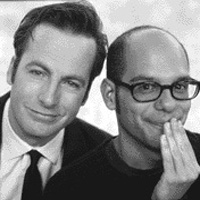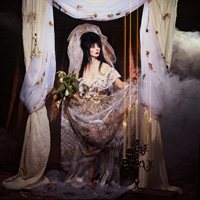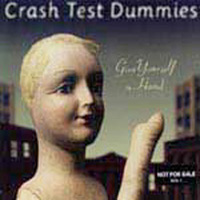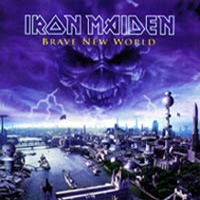 Mr. Show
Mr. Show
An interview with Bob Odenkirk and David Cross
by William Ham
(A discussion with the minds behind the funniest, most original and least predictable show on TV, Mr. Show with Bob and David [now in its third season, Fridays at midnight on HBO] and the mouths they’re connected to: Bob Odenkirk [who plays Bob] and David Cross [who doesn’t].)
Bob Odenkirk: So, tell us about Lollipop.
We take on the whole of pop culture with a touch of the absurd and the sarcastic.
Bob: That is not right. It should be treated with respect and reverence.
I’ll have to talk to the Editor about that… Are you guys happy with the way the show’s turned out this year?
David Cross: Yeah, especially considering how hard it was and what limited resources we had, it was okay.
Are we talking budgetary resources?
David: Budget and time.
Bob: And talent. David is not as talented this year as he was last year.
David: Do not eat the cole slaw, that’s all I gotta say.
Has HBO been treating you well? Obviously, having worked in more traditional network comedy outlets, you must relish the chance to work in less restrictive territory, but do they impose any restrictions on you?
David: They impose some really harsh tariffs, especially if we want to import goods or jokes from countries they have listed as terrorist or rogue nations, then the tariffs levied on us are extremely high.
Bob: We don’t have many, no. HBO trusts us. I don’t think it’s so much that HBO is a free-for-all, I think it’s because they put a lot of trust in David and I to do a show, if it’s going to be provocative or deal with difficult subjects, that we’ll do it in such an absurd and silly way that no one could possibly take offense or that if we do make a point, we sort of make the right point. We don’t just go after people.
David: And there’s a certain place for that kind of thing on HBO. It behooves them to have a show that people are gonna talk about – it’s edgy, maybe a little offensive, so it gets people’s interest and makes them tune in.
Bob: As far as we’re concerned, we don’t do anything to get HBO a bunch of press. We’re not just trying to get into trouble, we don’t really give a shit about that. We’re just doing something that we think is funny and we’re very aware that if something is difficult or there’s nudity or there’s swearing, that we’re making the point that we want to make.
Are there any subjects that are beyond the pale?
Bob: No, there’re no subject that’s beyond the pale, it’s how you treat it. If you’re gonna have a retarded character in a scene and you want it to be funny, don’t have the joke be how retarded a person can be. Make the joke be about how retarded people are treated, how they’re portrayed on TV or make it about something else.
Like when the retarded parent of the normal kid stands up in the principal’s office and says “I’m strong, like Hulk!” in the “Cyrus Dewey Awards” sketch…
Bob: Right, that’s funny, but it’s not funny outside of its context. People miss contexts all the time – that’s why we’ve put ourselves in a venue where you have to make an effort to watch us. You have to pay to get HBO and hopefully, having made that effort to get to us, you’d make that extra effort to get what we’re saying. If we were somewhere else, that kind of misunderstanding would come up more often – religious people would stumble across it, and you cannot make fun of that at all. To most Jews or Catholics or Baptists, there is not a single aspect of their own religion which is funny in the slightest. But that’s because they’re out of their minds.
I’m sure you’ve noticed that we’re in the middle of a sort of comedy surplus or comedy glut – there just seems to be too much of it. What do you think of the state of American comedy right now? Is it diluted by too much product?
David: I don’t see much of a difference from when I was growing up. Just like then, there’s exciting, new, fresh comedy, and an enormous spate of unfunny comedy. There’s certainly more comedy because of basic cable, and then, of course, the whole “comedy boom” of the late seventies/early eighties… that’s all in my adult lifetime, so I don’t see things as having changed too much – there’s always gonna be something good and new and there’s always gonna be lots of shit.
Who represents the state of the art of American comedy to you right now?
David: One thing that’s come about in our generation is a real resurgence in animated comedy. I mean, The Simpsons is just great, and even when it’s not as funny, it’s still funnier than the vast majority of the stuff out there. But state of the art, I don’t know… there are some performers that are doing things differently. There’s a group called Tenacious D who we’ve worked with on some short films that are gonna air after the last couple of Mr. Shows. They’re these two guys who play guitar and… well, to describe it would probably give off the wrong impression, so I’ll just say that it’s very funny and very cool. There’s a woman named Mary Lynn Rajskub, who’s been on our show and is now on The Larry Sanders Show, she has a one-woman show that’s very good. There are performers like Patton Oswald, traditional stand-ups who are bridging conventional stand-up and the idea of alternative stand-up, which is more personal, more observational, and he’s one of the best at that type of comedy. There’s a really big, thriving creative scene out here in L.A. that I hope will start to expand across the country.
You mentioned the whole notion of alternative comedy, which, like with music, is a term most people disdain because it doesn’t mean anything…
Bob: There’s no such thing as alternative comedy, that’s crazy.
David: Yeah, it’s really only describing what it’s not. Alternative music is not the Rolling Stones, alternative comedy is not normal stand-up or sitcoms, but you can’t get more specific than that. It’s as variant as a color wheel, there’s all sorts of different shades.
Most of the people you mention are not sketch comedians, and, other than your show, there doesn’t seem to be anyone doing anything interesting with the format. Has sketch comedy become something of a lost art?
David: I don’t know about a lost art, but people just aren’t doing anything new with the format. This sounds shitty, but what it comes down to is poor, unimaginative, lazy sketchwriting, and it seems to fit a formula that seems to have been established decades ago…
Bob: You know what? I think what people miss is that the format of sketch comedy is nothing, it’s just short pieces, there’s nothing to it. What has been missing is a point of view. David and I have worked very hard, we’ve both done all kinds of different comedy and it’s all been very personal to us. We’re not just doing this because it was asked of us, we went out and did this show because we have points of view on things, you know? We have a comedic vision. And most of the people who are doing sketch comedy, as it turns out, don’t, but that’s true of every form of comedy.
Sure, that’s an across-the-board thing. Most sketch comedy I see consists largely of people yelling loudly.
Bob: The point they’re trying to make is that people don’t talk loud enough, and wouldn’t the world be great if people would just talk louder? No, the point they’re trying to make is, wouldn’t it be great if I could make a living doing a sketch comedy show, so I get rich doing it like Quincy Jones or Lorne Michaels? That’s the perspective they want to let everyone in on.
Speaking of which, Bob, you worked under Mr. Michaels for a few years there, and I don’t want to get too far into the subject of SNL because every article that gets written about you has to use that as a reference point, but I’m very curious about the fact that there seems to be such an aura of secrecy about that show from those who work and have worked there, almost a code of silence.
David: It’s a testament to the enormous reach of Lorne Michaels’ outstretched tentacles.
Bob: I think one of the reasons you find that is because most people find it difficult to describe their experience of that place, because their experience was a lot more than what it should have been, which is a fun place to work and express yourself in a great way. That’s all it should be, but it’s not because it’s about a lot more than doing comedy, and that’s what kills it every week. It’s about peoples’ egos, and it’s about this crazy institution that’s just such a beast and it has so much weight to it and it smothers original points of view and brutalizes peoples’ spirits. And it feels weird to talk about it like that, because it’s only a TV show. It’s strange to build up all these negative feelings and all this emotional frustration over a goddamn TV show that you worked on for a couple of years.
David: Also, you get the sense that people outside of it only have a peripheral interest in it.
Bob: And you can’t blame them. It’s like a family, you know – if you were sitting around with your friends and they said, “Did you have fun going home for Thanksgiving?” And really, you didn’t have fun, you had the long, involved, serious psychosis you go through every time you see them, and you launch into this long description of it, you’d very quickly think, “aw, they don’t wanna hear all this. All they wanna hear is, ‘yeah, I had a good time. Everyone had a lot of fun.’ But it wasn’t a good time and everyone didn’t have fun! But how much does the world have to get dragged through the craziness of that place? I don’t think about it all that much, anyway.
Except when people like me pester you about it. What about the commonly-held dictum that a phenomenon, in comedy especially, is good for three to five years and then it isn’t anymore?
Bob: That happens with everything. People lose the excitement of discovery, and once you lose that, you turn on it. The first one or two times you saw something, there was a certain energy to it that went with it being new. And once that’s gone…
David: But that’s why something like Monty Python still holds up, because each show had its own personality and there’s a different theme, a different feeling to each show, unlike something like SNL or Mad TV, where, granted, they have a lot of work to do in a short amount of time and they’re really restricted – but they end up bringing back the same characters and saying the same things every week, which lends itself to what Bob was saying, but I think that’s why our show will hopefully have a little bit more staying power because we introduce so many different ideas and each show has a slightly different character to it.
Well, enough of that, let’s get to the important questions. If Mr. Show were a tree, what kind would it be?
David: A finch.
Bob: That’s a bird.
David: Well, it’d be a bird, then. And that bird would be a finch.
Okay, good. Um… any tabloid-like revelations you care to make on the record today?
Bob: David and I… should we admit it, David?
David: Yeah, I guess, I mean, I don’t know if this is the time or the place, but the readers of Lollipop have a right to know…
Bob: David and I… (choking up)… goddammit, it’s tough… are married.
David: To our work. We got married to our work in a small ceremony in Hawaii.
Bob (crying): Where it’s legal.
David: Also, I’m starting to go a little bald. And Bob found a potion that’ll make him younger.
Bob: But nobody wants to hear about that.
Yeah, it’s been done. What about the Bob and David philosophy? What pearls of wisdom can you share with the kids?
David: I’d say “follow your dreams.” It sounds corny, but it’s really as simple as that. Pretend your dreams are an eagle and follow it wherever it takes you. You might end up in the Pacific Northwest, but there’s some beautiful country up there. Follow the eagle.
Bob: What about the dream?
David: Oh, it’s lashed with cord to the eagle’s back.
Bob: For me, it’s the opposite. Run away from your dreams. When you wake up in the morning, get the hell out of there. Flee your dreams. Also, whatever Keenan Ivory Wayans does, do the exact opposite. That way you’ll never go wrong.



